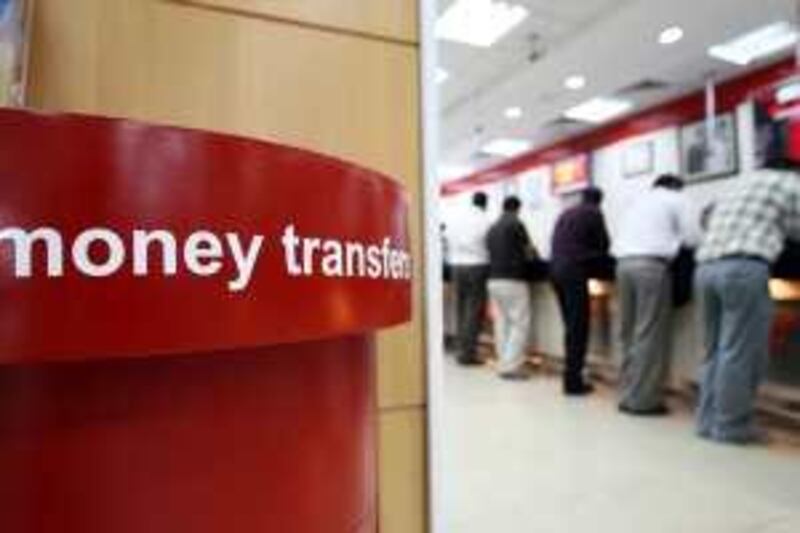ABU DHABI // As big companies prepare to meet tomorrow's deadline for paying all workers by electronic transfer, many have had to face a challenge they may not have expected: many of their employees cannot read, let alone use an ATM.
Ahmed Kamil, the manager of human resources for the Dubai-based ETA Ascon group, a construction company, said the transition had been "very challenging". "The first two months, we had to educate them on how to operate these machines. "And this is going to be a big challenge for any company in their first two months of implementing the new system." Many workers cannot read Arabic or English, the two languages most commonly used on ATMs.
The Wages Protection System is designed to help the Ministry of Labour keep track of all salary transactions, regardless of a worker's salary level or occupation. The electronic records will enable the ministry to monitor late payments and any withheld wages. The system was introduced in September and will be enforced in three stages. From tomorrow companies that employ more than 100 workers must comply. Firms with fewer than 99 workers are required to comply by the end of February; those with fewer than 15 have until the end of May.
Until now, many workers have been paid in cash, with payment records rarely being kept, making it hard to track those companies that paid late or not at all. Under the new system, all businesses must choose a third party - a bank, money exchange or financial services company, which must be approved by the UAE Central Bank - through which their workers will be paid. Companies then instruct their banks to transfer wages to the workers. These instructions should be accompanied by a detailed wage list, a copy of which will also be sent to the agencies distributing the payments.
Mr Kamil said that although ETA Ascon had been using an electronic banking system to pay its workers for the past three and a half years, it was going to convert to one of the new systems. He said that previously, especially in Dubai, where the company has 8,000 workers in one of its camps (although 12,000 workers will benefit from the new system), there were ATMs that the workers were able to access with their banking cards.
However, by the end of the month, the company would work with a Central Bank-approved company called Workers Equity Holdings, which would establish its own cash machines in two of the company's labour camps, in Al Quoz and Sonapur. The new banking company would also be responsible for loading the cash into the machines, which are already being tested in the Al Quoz camp. For the company's 300 workers in Abu Dhabi, who are based at projects in Al Ain, the island of Abu Dhabi and Al Gharbia, Mr Kamil said the company was dealing with a "scattered" workforce and was still making arrangements with financial services companies so that workers would receive their prepaid cards on time.
"We will be able to do it by deadline," Mr Kamil said last week. The electronic system will also remove uncertainties about delayed payments and eliminate the problems of distributing monthly wages in cash to thousands of workers. The risks of directly handling cash will be reduced and workers will avoid the long queues and crowds associated with collecting their pay. However, some workers were nervous about the changes. J Rajesh, a worker in Dubai, said he and other subcontractors in his electrical repair company had been informed about the change in payment by their project manager.
"We are a bit worried about how to use the card. "The new system has not been explained to us fully," he said. "But getting paid on time will be nice." The electronic cards issued by several banks, including HSBC and Citibank, are intended to be particularly attractive to workers who can use them, like debit cards, at grocery stores, and to transfer money home without having to handle cash directly.
"Now you don't have to wait for that cash van to access your cash. You can go around the corner to small grocery shops that accept the cards," said Surendra Bardia, the head of cash management with Citibank in the UAE. "You can use the card for grocery purchases directly, and we don't have to stuff the ATMs with cash. The moment you start handling cash, it becomes more expensive and unsafe." Research by the bank has shown that the top three expenses for labourers are remittances, cash withdrawals for phone calls and regular food purchases.
Mr Bardia said the bank had introduced the new payment system in collaboration with several companies that will, in turn, distribute the cards to workers. Citibank said at least 50 companies from Abu Dhabi and Dubai had signed up and thousands of cards would be issued. The new flow of customers has prompted Citibank to set up a multilingual customer service system with staff that speak languages including Arabic, Urdu, Bengali, Tamil, Malayalam, Telugu and Kannada.
Failure by companies to meet the payment system deadline will result in the ministry denying new work permits. Only once a company complies with the system, and after a month of electronically transferring wages in full, will the ministry allow it to function again. In the case of payments delayed by more than a month, companies also face a cancellation of new work permits. sbhattacharya@thenational.ae






